Book by school children raises funds for librarypublished at 06:27 GMT 7 March 2024
Cosmic Cats, partially written by Kennington primary school students, will help towards setting up the first public library in West Kenya.
Read MoreCosmic Cats, partially written by Kennington primary school students, will help towards setting up the first public library in West Kenya.
Read MoreA bill that will impose jail terms for simply identifying as LGBTQ+ is terrifying the gay community.
Read MoreSome 200 displaced people were collecting firewood outside their camp when they were attacked, residents say.
Read MorePeers fight to change the government bill aimed at deporting asylum seekers to the East African country.
Read MoreWe'll be back on Friday
That's all from the BBC Africa Live team for now.
Until we're back, there'll be an automated service here, plus you can get the latest news on our website or listen to our podcasts - Africa Daily and Focus on Africa.
Our African proverb of the day:
Quote MessageThe fastest eater ends up with a burned mouth."
A Luhya proverb sent by Humphrey Lumadede in Vihiga, Kenya
Click here to send us your African proverbs.
And we leave you with this shot of a protest held by the climate activist group Extinction Rebellion in South Africa.
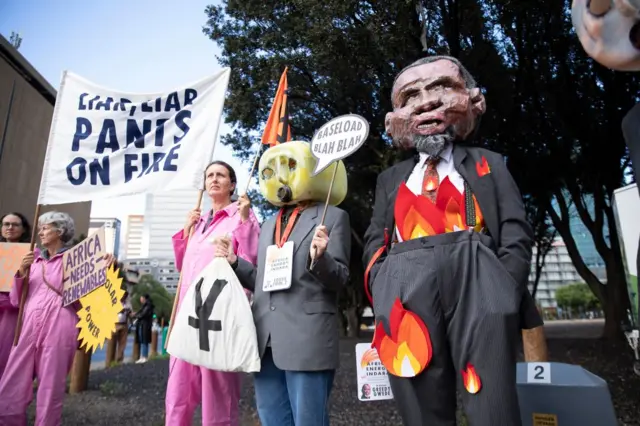 Image source, Getty Images
Image source, Getty ImagesMariam Ibrahim, one of the few female borehole engineers in north-east Nigeria, has built over 200 boreholes.
Read More Muthoni Muchiri
Muthoni Muchiri
BBC Africa Daily
Labour laws in Africa need to catch up with the new "paradigms" of employment, says the Ghanaian lawyer who won a lawsuit against Elon Musk's X, formerly known as Twitter.
Carla Olympio, founder of Agency Seven Seven, was representing former Twitter employees who were fired without pay from the company's Africa headquarters in Ghana after Mr Musk took over in 2022.
Last month she won the lawsuit against X and secured redundancy settlements for the ex-employees.
Following her landmark win she spoke to BBC Africa Daily and stressed the importance of labour laws in safeguarding African workers in corporate transitions.
She said there was a gap in the law towards addressing newer ways of working, such as increased remote work, and general employment in Africa.
“The issue in Africa, and it’s not just in Africa, is that some of these newer paradigms of employment have not been specifically addressed,” she added.
She said multinational employment brings opportunities for growth and stability.
Ms Olympio added that prioritising legal safety measures becomes crucial to protect employees from unexpected challenges and ensure fair treatment.
 Will Ross
Will Ross
Africa editor, BBC World Service
The United Nations has called on members of parliament in The Gambia to withdraw a bill lifting the ban on female genital mutilation (FGM).
The Gambia's parliament began examining the legislation on Monday.
FGM was banned in The Gambia in 2015.
Influential Muslim clerics have been pushing for the ban to be repealed, while women's rights activists want it to remain.
The UN says more than three-quarters of Gambian women and girls aged between 15 and 49 have undergone FGM.
The Office of the UN High Commissioner for Human Rights described the bill as abhorrent.
It said it was crucial that The Gambia continued to protect the rights and dignity of all, especially women and girls.
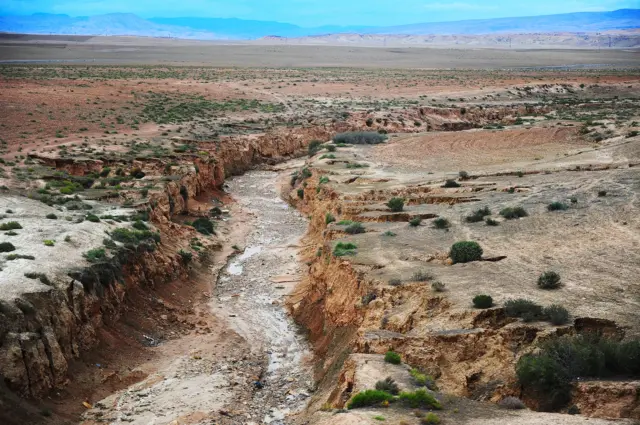 Image source, Getty Images
Image source, Getty ImagesMorocco has experienced six consecutive droughts
Morocco experienced record high temperatures this winter, and has blamed climate change, according to French news agency AFP.
Temperatures in the North African country reached 37C. Morocco is facing its sixth consecutive year of drought.
The ongoing drought is alarming as agriculture is a key economic sector.
Morocco recorded the "hottest month of January since the first measurements in 1940," Houcine Youaabed, the head of communications for the meteorological department, told AFP.
Mr Youaabed said this reflects "the consequences of global warming".
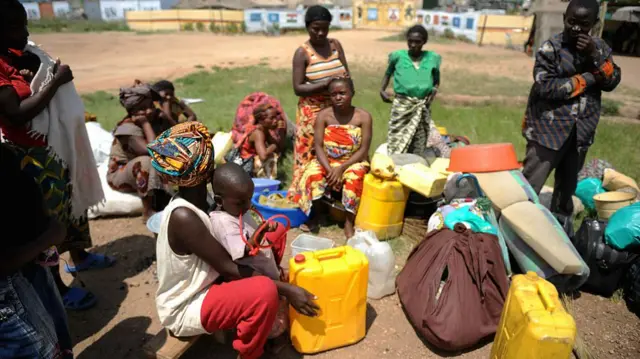 Image source, AFP
Image source, AFPNyanzale is home to thousands of people who had been displaced by fighting in surrounding areas
Fighters from the M23 rebel group have captured the town of Nyanzale from the military in the eastern Democratic Republic of Congo.
"We are now in Nyanzale, the enemy has fled,” rebel spokesperson Willy Ngoma told the BBC Great Lakes service.
Army commander Jerome Chico Tshitambwe confirmed to the Reuters news agency that Nyanzale has been taken by the rebels.
Nyanzale, which is about 130km (80 miles) north of the city of Goma, had been a place of refuge for people displaced by fighting in surrounding areas.
But earlier this week thousands of them fled again when Nyanzale came under fire.
Mr Ngoma said many had now returned to the town.
Isaac Kibira, a deputy to the governor in the nearby town of Bambo, said M23 had been firing “indiscriminately” before taking Nyanzale.
“It is since the morning that we noticed the capture of Nyanzale by the M23, and the death toll rose to 15," Mr Kibira told Reuters.
The M23, formed as an offshoot of another rebel group, began operating in 2012 - ostensibly to protect the local Tutsi population that has long complained of persecution and discrimination.
Its fighters took up arms again in 2021, saying promises in an earlier peace deal had been broken. M23 fighters are well equipped, but the group denies being a Rwandan proxy.
On Monday, the European Union said it was "extremely concerned by the escalation of violence" and called for dialogue between DR Congo and Rwanda in order to tackle the root causes of the conflict.
You may be interested in:
Officials objected to a performance which featured sexually explicit language and gestures.
Read More Will Ross
Will Ross
Africa editor, BBC World Service
Senegalese MPs are debating an amnesty bill which includes plans to free opposition supporters who have been imprisoned in recent years for taking part in protests.
The amnesty is aimed at ending the political turmoil that was triggered by President Macky Sall's decision to postpone last month's elections.
It is not clear if the amnesty would be applied to the jailed opposition politician Ousmane Sonko, whose supporters have held numerous demonstrations.
The security forces responded with violence to protests killing dozens of people and arresting hundreds.
Critics of the bill say it will be used to exonerate government and security officials for the deaths of protesters.
More on Senegal:
Tunisian filmmaker Kaouther Ben Hania has received her second Oscar nomination.
Read MoreMoses Kollie Garzeawu
Journalist, Monrovia
 Image source, AFP
Image source, AFPOn the campaign trail last year, Joseph Boakai promised to tackle corruption
Liberia's President Joseph Boakai has set up a task force to crackdown on corruption and to recover stolen state assets.
Mr Boakai ordered it to identify and prosecute any senior officials involved. Current and past government officials are to be investigated.
His executive order said assets "wrongfully acquired at the expense of the government and people of Liberia" should be returned.
It was imperative to "curtail this alarming menace that has engulfed our country", the president said.
People who purchased government assets illegally would also be forced to return them.
Individuals who live outside of Liberia and are suspected of siphoning off public assets could face extradition.
Funding has been allocated to the task force, which will begin work immediately.
On the campaign trail last year, Mr Boakai promised to tackle corruption.
He went on to win the election, beating former President George Weah in a run-off with just over 20,000 votes.
Mr Weah's presidency was plagued with accusations of corruption and faced criticism for the excesses of senior officials.
After Mr Boakai's inauguration in January he asked former officials to turnover government assets they had in their possession “without delay and hesitation”.
 Image source, AFP
Image source, AFPMillions of Sudanese have fled their homes since the conflict erupted in April
Sudan's military-led government has said it will allow some humanitarian aid to be delivered via Chad and South Sudan.
It had banned deliveries via Chad after accusing the United Arab Emirates (UAE) of using aid convoys to supply weapons to the paramilitary Rapid Support Forces (RSF). The UAE has denied doing so.
Clementine Nkweta-Salami, the UN humanitarian co-ordinator in Sudan, said the move was a "welcome step" and would help reach people in "dire need of life saving assistance".
Ms Salami said the government had agreed to open airport routes for humanitarian aid in Fasher, Kadugli and El Obeid.
More than 10 months of conflict between rival military forces has left thousands dead and about eight million displaced.
The UN World Food Programme (WFP) has said the war in Sudan could trigger the world's largest hunger crisis if the fighting does not stop.
More stories on Sudan:
 Nichola Mandil
Nichola Mandil
BBC News, Juba
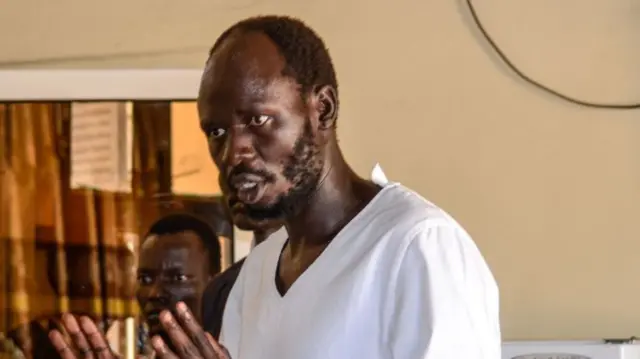 Image source, AFP
Image source, AFPPeter Biar Ajak was previously sentenced for two years in prison in South Sudan
A US district court has charged a prominent South Sudanese activist, Peter Biar Ajak, with conspiring to purchase and illegally export weapons worth millions of dollars.
He was charged alongside his compatriot Abraham Chol Keech.
They are accused of colluding to buy weapons such as automatic rifles, grenade launchers, Stinger missile systems, hand grenades and other export-controlled items from the US to South Sudan.
They have not commented on the allegations.
The sale of weapons to South Sudan is prohibited by two US laws.
South Sudan has also been subject to an arms embargo by the UN Security Council that was initially imposed in 2018 and has been renewed several times since then.
The court said that as part of the illegal scheme to smuggle the weapons, the accused agreed to a $4m (£3.5m) contract worth of weapons and related items.
They also requested a “fake contract” in the same amount for consulting services and items such as communications equipment for use in refugee camps, a statement by the US Justice Department said.
Mr Ajak, a Harvard fellow and a vocal critic of President Salva Kiir’s government, was arrested in 2018 and sentenced to two years in prison.
He was pardoned by the president in January 2020.
South Sudan’s foreign affairs ministry has not yet commented on the arrest of the two.
 BBC World Service
BBC World Service
Dozens of displaced people have been abducted by suspected Boko Haram jihadists in north-east Nigeria's Borno State.
Officials say the victims were seized when they were collecting firewood in a forest.
It is not yet clear how many people are missing and exactly when they were taken.
Some local media reports say more than 300 were abducted - most of them women and girls but this has not been independently confirmed.
The AFP news agency was told 47 women were still missing.
Over the last 15 years, Islamist insurgents have carried out frequent attacks and mass abductions in north-east Nigeria, displacing two million people.
The incident comes after the Borno State government said almost all Boko Haram fighters were either dead or had surrendered to the authorities.
 BBC Monitoring
BBC Monitoring
The world through its media
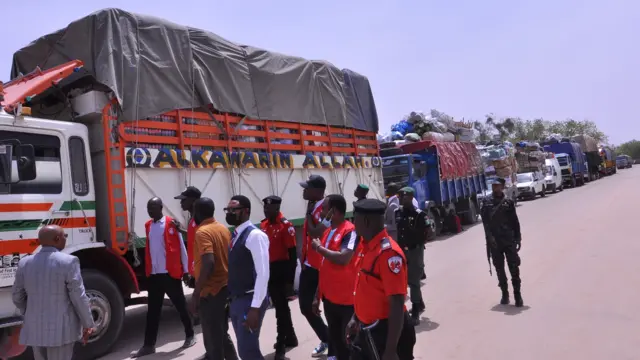 Image source, EFCC/X
Image source, EFCC/XSmuggling of food has worsened Nigeria's ongoing food insecurity crisis
Nigeria has seized 21 trucks with food bound for Chad, Central African Republic and Cameroon amid a scarcity of staple foodstuff.
The shortage is partly linked to smuggling and has sparked protests in several states.
The Economic and Financial Crimes Commission (EFCC) uncovered the food concealed among household commodities in north-eastern Borno state.
“The arrest of the trucks is expected to stem the tide of food insecurity occasioned by unscrupulous antics of smugglers across the country,” the EFCC said in a statement.
The Nigerian government plans to begin distributing 42,000 tonnes of grain across the country to quell public anger at spiralling food prices.
The food crisis in Nigeria has partly been blamed on President Bola Tinubu's decision to end a fuel subsidy in May last year.
The crisis has been worsened by the recent depreciation of the local currency, the naira, which has shot up food prices.
The African Development Bank has provided $134m to Nigeria to enhance food production following its warning in February that the country could face social unrest over a cost-of-living crisis.
Read more on Nigeria's food crisis:
Police say arrests are on the cards, following the six-year-old's disappearance on 19 February.
Read More Image source, Getty Images
Image source, Getty ImagesThe 30-year-old is one of the biggest musicians in East Africa
Popular Tanzanian singer Zuchu has apologised after authorities in Zanzibar suspended her from all artistic activities on the archipelago for six months over a performance they deemed inappropriate.
Zuchu's performance on Zanzibar's Kendwa island last month featured sexually explicit language and gestures.
The Zanzibar Arts, Census, Film and Cultural on Tuesday said that the performance went against the islands’ customs, traditions and culture.
It also asked Zuchu to submit a written apology.
In a video shared to her Instagram late on Tuesday, the musician apologised for any offence caused by her performance.
“The goal was to entertain and not to mislead,” she said.
Zuchu, real name Zuhura Othman Soud, is one of the most successful musicians in East Africa.
The 30-year-old is the first female musician in East Africa to gain one million YouTube subscribers, which she achieved in a year.
She is also the first female musician in East Africa and only the fifth female artist on the continent to surpass 500 million YouTube views, according to her label WCB Wasafi.